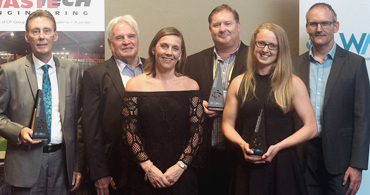
L to R: Mike McConnell, National Product Manager – Projects, Wastech Engineering Pty Ltd;
Kevin Flanagan, General Manager - Water and Waste Services, Toowoomba Regional Council;
Gayle Sloan, CEO, WMAA; Troy Uren, Manager - Waste Services, Toowoomba Regional Council;
Melissa Pearce, Project & Operations Officer, Dulverton Waste Management & Phil Carbins, ALOA